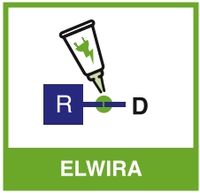ELWIRA Electrochemical hydrogen isotope redox exchange labeling |
In the ELWIRA project, an electrosynthetic laboratory is being set up at the industrial partners in collaboration with the Johannes Gutenberg University to investigate electrochemical proton-deuterium exchange.
In the pharmaceutical industry, deuterium-labelled compounds play a special role in mass spectrometry studies, as internal standards and in the structural optimization of drug candidates. Furthermore, deuterated solvents are essential for NMR spectroscopy, which today is one of the most important analytical methods for organic structures down to biological macromolecules.
One of the most efficient methods to produce deuterated compounds is proton-deuterium exchange. Since these methods are metal catalyzed and these reactions often plateau below >95% deuterium incorporation, a high efficiency electrochemical approach is of particular interest. The electrochemical redox exchange of hydrogen isotopes is a mild method to enable the incorporation of deuterium into organic molecules and solvents efficiently or at low cost.
To make this possible, the electrochemical and process expertise of the Max Planck Institute For Chemical Conversion are combined with the marking expertise of Sanofi and Deutero, which enables a rapid transfer of the developed reactions from research to application.
Coordinator:
Siegfried R. Waldvogel (MPI CEC) siegfried.waldvogel@cec.mpg.de
Volker Derdau (Sanofi)
Philipp Schnieders (Deutero) p.schnieders@deutero.de

